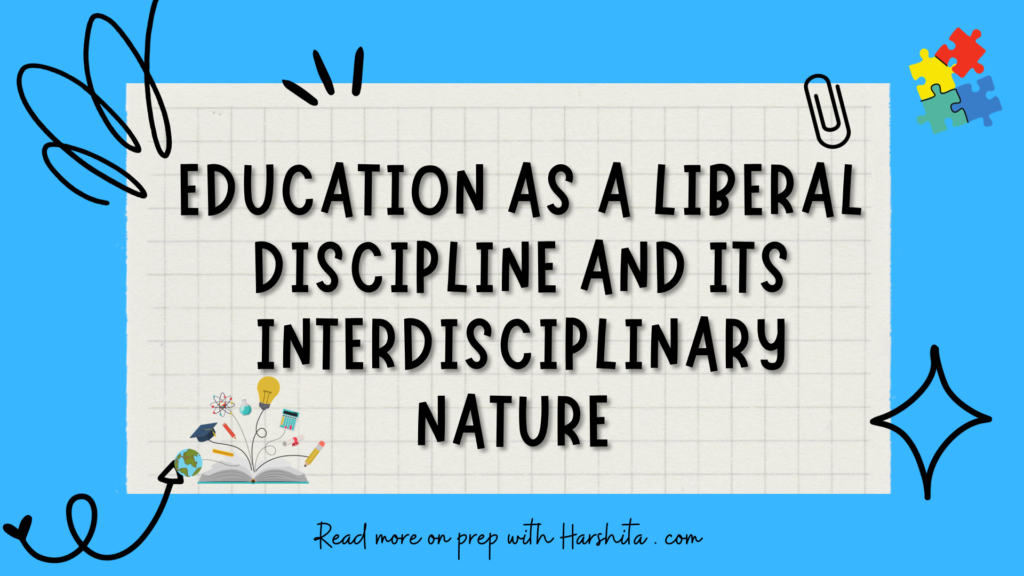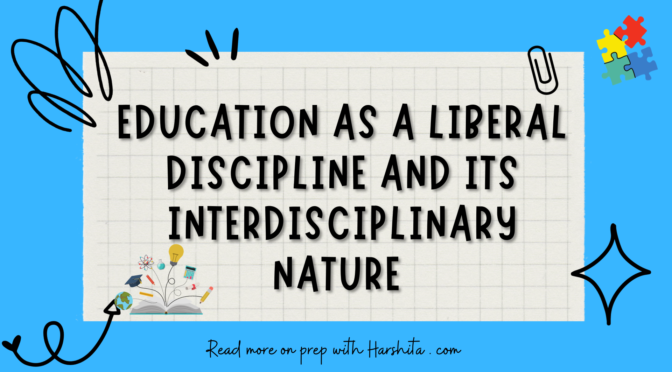Education is often considered a liberal discipline, and its interdisciplinary nature is a key aspect that contributes to its richness and complexity. Let’s study more about education as a liberal discipline and its interdisciplinary characteristics:
Education as a Liberal Discipline:
- Broad Knowledge Base: A liberal education in the context of education implies a broad and comprehensive knowledge base. It involves exposure to a range of subjects beyond the specialized skills required for a particular profession.
- Development of Critical Thinking: Liberal education encourages critical thinking and analytical skills. It goes beyond rote memorization and focuses on understanding concepts, making connections between ideas, and developing the ability to think independently.
- Emphasis on Inquiry and Exploration: Liberal education encourages students to explore various fields of knowledge and engage in inquiry-based learning. It aims to cultivate curiosity and a lifelong love for learning.
- Civic Engagement: A liberal education often emphasizes the importance of civic engagement and the development of responsible and informed citizens. It helps in developing values such as social responsibility, ethical reasoning, and a sense of community.
Also Read: Difference between Language and Communication
Interdisciplinary Nature of Education:
- Integration of Multiple Disciplines: Education involves the integration of knowledge from various disciplines. For example, a lesson on environmental issues might incorporate elements of biology, chemistry, geography, and sociology. Interdisciplinary approaches help students see the interconnectedness of different fields.
- Real-World Problem Solving: Many real-world problems are complex and require solutions that draw on knowledge from multiple disciplines. Education, when designed to be interdisciplinary, prepares students for addressing complex issues by providing them with various tools and perspectives.
- Holistic Understanding: Interdisciplinary education allows an in-depth understanding of topics. Instead of studying subjects in isolation, students can explore how different disciplines contribute to an understanding of a given phenomenon or problem.
- Preparation for a Changing World: The world is characterized by complexity and rapid change. Interdisciplinary education helps individuals with the adaptability needed to understand things better. It prepares them to think across traditional disciplinary boundaries.
- Problem-Based Learning: Interdisciplinary education often involves problem-based learning, where students collaboratively work on real-world problems that require knowledge and skills from multiple disciplines. This approach promotes teamwork, communication skills, and a deeper understanding of the interconnectedness of knowledge.
- Global Perspectives: Education with an interdisciplinary focus often incorporates global perspectives. It helps students appreciate the interconnectedness of global issues and prepares them to engage with diverse cultures and ideas.
Also Visit : Prep with Harshita


